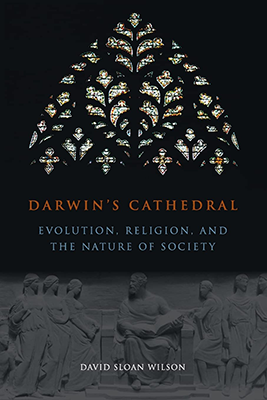Darwin’s Cathedral
“Darwin’s Cathedral: Evolution, Religion, and the Nature of Society” by David Sloan Wilson is a book that explores the evolutionary origins and functions of religion from a scientific perspective. Here’s a summary of the key themes and arguments presented in the book:
Evolutionary Perspective on Religion: Wilson applies principles of evolutionary biology to understand the persistence and diversity of religious beliefs and practices across human societies. He argues that religion can be viewed as an adaptive trait that has evolved to enhance cooperation and social cohesion among groups.
Group Selection: Central to Wilson’s thesis is the concept of group selection, where traits that benefit groups (even at the expense of individuals) can evolve and persist over time. He suggests that religious beliefs and rituals may have evolved because they promote cooperation within groups, contributing to their survival and success.
Cultural Evolution: Wilson emphasizes the role of cultural evolution in shaping religious practices and beliefs. He explores how religious institutions and rituals can function as adaptive mechanisms that regulate behavior, foster trust, and coordinate group activities.
Variation in Religious Practices: Wilson acknowledges the diversity of religious beliefs and practices across different cultures and societies. He argues that this diversity reflects adaptive responses to local ecological, social, and historical contexts, rather than a universal or static phenomenon.
Critique of Reductionism: While Wilson applies evolutionary principles to understand religion, he critiques reductionist approaches that oversimplify the complexity of human behavior and culture. He emphasizes the need for interdisciplinary approaches that integrate insights from evolutionary biology, anthropology, psychology, and sociology.
Implications for Understanding Society: “Darwin’s Cathedral” has implications for understanding broader societal issues, such as the role of institutions, norms, and ideologies in shaping human behavior and cooperation. Wilson suggests that studying religion through an evolutionary lens can deepen our understanding of social dynamics and contribute to solutions for contemporary challenges.
Debate and Influence: The book has sparked debate among scholars in various disciplines, particularly regarding the applicability of evolutionary theory to cultural and social phenomena like religion. It has influenced discussions on the evolutionary origins of religion and the adaptive functions of belief systems.
Overall, “Darwin’s Cathedral” offers a provocative exploration of religion as a product of evolutionary processes, challenging traditional perspectives and offering new insights into the role of religion in human societies.

